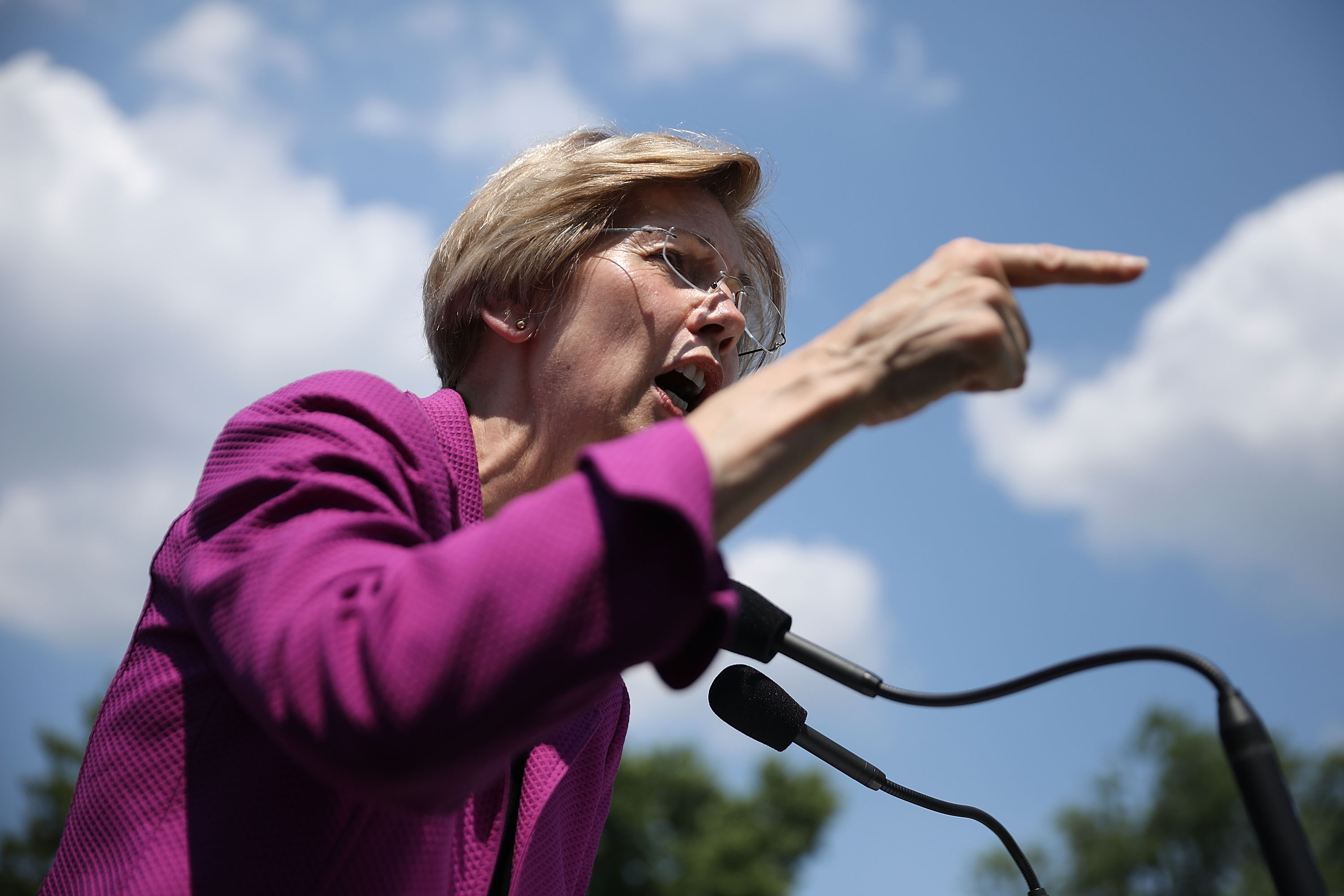The return of the trust-busters
How Democrats learned to hate monopolies again


Over the last few months, the country has borne witness to the deeply humiliating spectacle of American cities desperately groveling before Jeff Bezos, the head of Amazon, while vying to become the site of the company's second headquarters. Amazon promises $5 billion in investment and up to 50,000 high-paying jobs if a city meets a long list of qualifications. The city must be a metro area of over a million residents, have good highways, mass transit, an airport, and universities, and above all, it needs to fork over a hefty bribe — er, I mean, it needs to have a "business-friendly environment and tax structure" and identify other "incentive programs." What that means is depressingly familiar.
Many states and cities are eager to pay up. Wisconsin's legislature put together a $3 billion proposal — $60,000 in subsidies per job — while New Jersey promised to one-up them with a $7 billion payola package.
Such behavior would have been no surprise to Louis Brandeis, the lawyer, Supreme Court justice, and intellectual force behind a keystone part of mid-20th century political economy. Brandeisian thinking is built on two key ideas, regulation and anti-monopoly, used to protect what he called "industrial liberty." It is making fast inroads among the Democratic Party elite, and will surely be one of the party's dominant ideologies in the future.
The Week
Escape your echo chamber. Get the facts behind the news, plus analysis from multiple perspectives.

Sign up for The Week's Free Newsletters
From our morning news briefing to a weekly Good News Newsletter, get the best of The Week delivered directly to your inbox.
From our morning news briefing to a weekly Good News Newsletter, get the best of The Week delivered directly to your inbox.
So who was Louis Brandeis? He was born in 1856 in Kentucky, the son of Czech Jews fleeing European anti-Semitism. He was a brilliant student, entering Harvard Law School by age 18, and afterwards starting a law firm with a partner. He was a tireless legal activist in his early career, taking cases to defend the poor, helping Massachusetts create a life insurance system, and developing new legal notions of a right to privacy.
Near the turn of the century, Brandeis turned his attention to monopolies and trusts. In those days, industrial magnates like John D. Rockefeller had rolled up whole markets under their direct control. By the 1890s, oil, sugar, steel, railroads, meatpacking, and many other markets were under the control of one or a few huge companies, leaving little competition. Brandeis, building on the thinking of Thomas Jefferson and James Madison, argued that this extreme concentration of wealth (Rockefeller's fortune was about $340 billion, adjusted for inflation) and market power reduced efficiency and innovation, undermined democratic freedoms, exploited labor, and eroded the sovereignty of the state itself.
In a 1912 speech before the Economic Club of New York, Brandeis noted how when faced with a tax increase, the tobacco trust passed the cost on to the consumer — but when the tax was removed, the price stayed the same, and the trust pocketed the difference. Effectively, it had arrogated to itself the power of taxation. He thus argued the trusts should be broken up, instead of regulated — not just to ensure competition, but to deliberately keep businesses small and profits moderate.
However, he did not favor the no-holds-barred competition of the Gilded Age, instead favoring "regulated competition," where the state forbids certain kinds of socially negative business tactics. That means, for example, common carriage rules for railroads (where they are not allowed to charge different prices to different businesses), so as to prevent the rail companies from exploiting their strategic shipping position to squeeze producers; or forbidding predatory pricing, where a business sells below cost to drive a competitor out of business. The point is to make competition happen between lots of smaller enterprises — and along axes of real price and quality, not who happens to control economic bottlenecks, or has the most deep-pocketed allies on Wall Street.
A free daily email with the biggest news stories of the day – and the best features from TheWeek.com
His argument about efficiency is worth examining, as it bears on modern thinking. He argued that past a certain size, businesses become less efficient. Sheer size is a problem in itself, as no manager can really know what is going on in a vast corporation. Worse, when a corporation obtains significant market power, it escapes from the discipline of competition, becoming stagnant and strangling innovation. Without competitive pressure, businesses tend towards endlessly producing the same standardized products for an easy profit, not the constant research and development required to maintain progress.
Brandeis' stance put him at odds with both right-wing Republicans and progressives influenced by socialist thinking of the day, as could be seen in the 1912 presidential election. William Howard Taft pushed the usual Republican line that business should be left to its own devices, while Teddy Roosevelt argued monopolies should, in general, be regulated instead. Woodrow Wilson, however, was convinced by Brandeis, and made him a principal adviser after winning the presidency. Wilson undertook the first serious program of trust-busting, and eventually appointed Brandeis to the Supreme Court in 1916. (Roosevelt made a few moves in this direction during his presidency, but it was Wilson who took anti-trust really seriously for the first time.)
A decade and a half later, President Franklin D. Roosevelt's New Deal had this same fault line. Early in his presidency, in the depths of the Great Depression, pro-concentration planners had the upper hand, leading to the creation of the National Recovery Administration. This agency published endless codes detailing prices, competition practices, and allowing both unions and industrial cartels.
This did not work as intended. It wasn't a total loss — in particular, the labor rights section enabled a huge surge of labor organizing — but the ultra-detailed regulations were a pointless hindrance and the new cartels did not restore employment and production. The Supreme Court declared the law unconstitutional in 1935.
With the planners on the back foot, the Brandeisians — led by Felix Frankfurter, a close adviser to FDR, and later Supreme Court justice — moved in, and set up what would become a key part of New Deal political economy. For three decades, Brandeisian thinking dominated both federal anti-trust policy and the regulatory state, which oversaw everything from transportation to food production.
In the 1960s and '70s, conservatives began to build a line of attack against anti-trust law, led by Robert Bork. He did it not by undermining the arguments of Brandeis, but by changing the subject and shifting the burden of proof. He presented a revisionist history of seminal anti-trust legislation as intended to promote "consumer welfare," not to promote competition and prevent concentration as such.
Bork invoked right-wing Chicago School economics then being developed to argue that very large businesses can deliver lower prices by definition, because of economies of scale. And because price was defined as the only axis of consumer welfare, he argued that mergers and acquisitions should not be prevented if a company could argue prices would drop.
By the Reagan administration, Bork's ideas had begun to take hold — fueled somewhat by a shameful endorsement from liberal economist John Kenneth Galbraith, who came to the same conclusion from a different direction. By the Clinton administration, they had become the dogma of both parties. By changing the basis on which judgments were made, Bork placed an almost insurmountable obstacle in the path of anti-trust policy, effectively killing it. (At a recent conference, former Judge Richard Posner said "antitrust is dead, isn't it?")
This was a key part of the neoliberal turn, the growth of inequality, and all the other problems detailed in the previous article in this series.
Today, the sort of problems that Brandeis identified are literally everywhere. Chicken, beer, eyeglasses, retail, computer chips, and a zillion other markets have been rolled up by one or a few big companies. Internet, cable, and cell phone service are dominated by a handful of gigantic telecoms, and service is generally poor and far more expensive than in Europe. Airlines, which have merged into just four big carriers, now compete by seeing who can best trick their customers with hidden fees.
There are also new challenges from the big three tech companies — Google, Facebook, and Amazon. These are somewhat different than the old trusts of yore, but are clearly amenable to a Brandeisian analysis. Google and Facebook have been deemed "platform monopolies," who utterly dominate internet search and social media respectively. In 2016, the two collected 99 cents out of every new dollar of internet ad spending.
Google in particular has tremendous structural power over the internet advertising space, due to their control over how ads are bought and sold (that is, in addition to controlling a large market share). Talking Points Memo's Josh Marshall, who has of necessity been deeply involved in the economics of internet publishing, has explained in detail how "Google’s monopoly control is almost comically great."
Amazon, as explored in a brilliant Yale Law Journal article by Lina Khan, is an odd combination of retailer and marketplace — but constantly uses its strategic position as the king of e-commerce in a predatory fashion that would be extremely familiar to Brandeis. It is notorious for punishing vendors who will not play by its rules, like the publisher Hachette, whose books were de-listed and shipping delayed during a dispute with Amazon. It has also used predatory pricing to devour competitors, like Diapers.com.
Elsewhere, there are signs that Bork's deliberately cramped view of antitrust is cracking apart. While price is one important aspect of consumer welfare writ large, it very obviously is not the only factor. Consumers are generally also workers (or supported by workers), for example, and large mergers almost always lead to thousands of layoffs. Indeed, that is a big reason why Wall Street buccaneers coordinate such things in the first place: so they can slash labor costs (and R&D spending), temporarily juice profits, and collect a quick payout — often at the expense of the business' long-term viability.
And as economist Marshall Steinbaum argues, there are strong signs that employers have gotten effective monopsony (or single-buyer) power over much of the labor market, implying that such considerations ought to get consideration in antitrust consideration. If monopolies threaten consumer welfare by restricting supply and raising prices, "[w]hy doesn't market power threaten welfare by reducing demand for labor and lowering wages?" he writes. Low prices are no help to people with no money to spend.
There are signs that monopolization is harming job growth on the other side of the corporate fence as well. Corporate profits are at sustained historical highs, which by typical economic reasoning ought to inspire increased business formation to get in on the action. But instead, the share of businesses under one year old has fallen by almost half since 1980, and is trending down.
"In this country most of the new jobs are created by entrepreneurs opening new businesses," says Barry Lynn, one of the most prominent Brandeisians working today (you might remember him from getting fired from the New America Foundation reportedly because of pressure exerted by Google). "But when you have these giant chains that control entire sectors of our economy, it makes it really hard for real entrepreneurs to create new businesses and create new jobs."
However, there are a few areas that Brandeisian thinking tends to leave out. The focus on companies and jobs can be of little use to those who can't work. Social democrats (to be covered in the next article in this series), by contrast, advocate for heavy increases in taxation, especially on the rich, so as to set up a generous, comprehensive welfare state to provide income for everyone who can't work — children, the elderly, the unemployed, the disabled, and so on. This was a problem with the original New Deal, which had only a pitifully small Social Security benefit, leaving poverty at over 22 percent in 1959. It was only after the Great Society welfare expansions that the U.S. started making inroads into structural poverty (especially among the elderly) caused by capitalist institutions.
Capital income also generally doesn't get much attention under the Brandeis framework. This amounts to about 30 percent of the national income, and is heavily concentrated at the very tippy-top of the income ladder — indeed, all income growth of the top 1 percent after 2000 has come from capital ownership. But the Brandeisians typically oppose schemes to take control of some of that income, by for example a sovereign wealth fund, as being "a bad thing [that] leads to tyranny," as Stoller puts it.
This brings me to the politics.
Lynn presents his thinking as something of a third way between left-wing Sanders Democrats and right-wing Tea Party extremists. Unlike the actual organization called Third Way, which is just the same old tired neoliberal bromides in a duplicitous package, this actually is a different way of thinking. However, despite some tentative support for anti-trust from a few Republicans, there is little sign that party is willing to abandon its traditional support for corporations. An aide to Sen. Mike Lee (R-Utah) was quick to tell Politico's Danny Vinik that Lee does not support overturning the Bork view on antitrust. Elsewhere, Wisconsin Gov. Scott Walker (R) recently signed a bill literally giving Foxconn preferential treatment in state courts.
So just as in the New Deal days, the Brandeisians have so far found their most sympathetic hearing on the left. Elizabeth Warren rode a classic Brandeis perspective to the Senate, and has become a top-tier national politician. Hillary Clinton was exploring anti-concentration policy in her campaign, and top liberal think tanks have announced support. Even the Obama administration's economists got on board towards the end of his term. Even its few halting efforts to prevent concentration paid dividends: When it blocked T-Mobile's efforts to merge with AT&T, the result was sharp improvements in cell phone service quality and price.
On one level, that's highly encouraging. But on another, it suggests that Democrats may not be ready to completely reverse the damage of neoliberalism. One advantage to regulation and anti-trust is "it allows Democrats to advance a populist economic agenda without asking the public to swallow large new tax increases or trust the government to competently administer a big new government program," as Matt Yglesias writes.
No doubt income and wealth inequality would be much lower with a return to New Deal-style institutions. But to really get the egalitarian goods, vast new taxes and vast new expansions of welfare are certainly needed. If they want to achieve the social justice outcomes that have become fashionable among rank-and-file Democrats of late, party leaders are going to have to learn to love taxes and spending, as I will explain in the next two articles in this series.
All that said, the Brandeisian perspective unquestionably has a lot to recommend it — which brings me back to Amazon and its second headquarters. Bezos has "subjugated entire cities," says Stoller. The American government, at all levels, has "lost the ability to direct economic activity." Instead, we have "vested sovereign power in private actors."
This focus on basic democratic liberty is perhaps the most appealing aspect of the Brandeisian perspective. Paying $60,000 in bribes per new job is no doubt inefficient in some arid economic sense. But the very fact that governments would openly consider such a thing is evidence of a horrifying tyranny. Corporations are a creation of the state, whose legitimacy rests on the American people as a whole. It's long since time they served the needs of the people, and not the other way around.
This is the second article in a four-part series on the future of the American left. You can read the first one here.
Ryan Cooper is a national correspondent at TheWeek.com. His work has appeared in the Washington Monthly, The New Republic, and the Washington Post.
-
 Time blindness: is being late a disorder?
Time blindness: is being late a disorder?In The Spotlight Understanding the cause of chronic tardiness can save a relationship
-
 Quiz of The Week: 3 – 9 January
Quiz of The Week: 3 – 9 JanuaryQuiz Have you been paying attention to The Week’s news?
-
 The Week Unwrapped: Is Elon Musk’s AI tool a platform for abuse?
The Week Unwrapped: Is Elon Musk’s AI tool a platform for abuse?Podcast Plus can Mumsnet predict who will be the next PM? And who is still watching Avatar sequels?
-
 The billionaires’ wealth tax: a catastrophe for California?
The billionaires’ wealth tax: a catastrophe for California?Talking Point Peter Thiel and Larry Page preparing to change state residency
-
 Bari Weiss’ ‘60 Minutes’ scandal is about more than one report
Bari Weiss’ ‘60 Minutes’ scandal is about more than one reportIN THE SPOTLIGHT By blocking an approved segment on a controversial prison holding US deportees in El Salvador, the editor-in-chief of CBS News has become the main story
-
 Has Zohran Mamdani shown the Democrats how to win again?
Has Zohran Mamdani shown the Democrats how to win again?Today’s Big Question New York City mayoral election touted as victory for left-wing populists but moderate centrist wins elsewhere present more complex path for Democratic Party
-
 Millions turn out for anti-Trump ‘No Kings’ rallies
Millions turn out for anti-Trump ‘No Kings’ ralliesSpeed Read An estimated 7 million people participated, 2 million more than at the first ‘No Kings’ protest in June
-
 Ghislaine Maxwell: angling for a Trump pardon
Ghislaine Maxwell: angling for a Trump pardonTalking Point Convicted sex trafficker's testimony could shed new light on president's links to Jeffrey Epstein
-
 The last words and final moments of 40 presidents
The last words and final moments of 40 presidentsThe Explainer Some are eloquent quotes worthy of the holders of the highest office in the nation, and others... aren't
-
 The JFK files: the truth at last?
The JFK files: the truth at last?In The Spotlight More than 64,000 previously classified documents relating the 1963 assassination of John F. Kennedy have been released by the Trump administration
-
 'Seriously, not literally': how should the world take Donald Trump?
'Seriously, not literally': how should the world take Donald Trump?Today's big question White House rhetoric and reality look likely to become increasingly blurred
